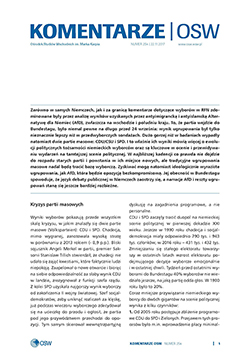Stalin w dzisiejszej Rosji. Popularny i potrzebny
Stalin in contemporary Russia: admired and required
Author(s): Katarzyna Chawryło (Jarzyńska)
Subject(s): Governance, Public Administration, Public Law, Government/Political systems, Geopolitics
Published by: OSW Ośrodek Studiów Wschodnich im. Marka Karpia
Keywords: Russia; Russian politics
Summary/Abstract: Despite the fact that more than 60 years have passed since the death of Joseph Stalin, the leader of the USSR from 1922 to 1953, the memory of him remains alive. For several years running Stalin has topped the ranking of the most remarkable figures in Russia’s history. Portraits of him appear at political demonstrations and religious events; new monuments to the dictator are erected. The Kremlin’s official rhetoric increasingly refers to the positive aspects of the Soviet era, in particular to the victory in World War II. Representatives of the state’s administration and the Orthodox Church have been making favourable comments about Stalin. However, Stalin’s popularity among society in today’s Russia is rather superficial – Russians know little about the dictator and his life; they are rather nostalgic about the period of his rule and the achievements of his era. The image of the Soviet dictator as an outstanding leader is blended with Russians’ individual memories of repression and terror which affected almost every Russian family. These reminiscences however do not penetrate the public sphere at the mass level, which makes it possible for the state’s narrative to dominate it. The Kremlin has exploited the ambivalent and superficial attitude which Russians have to Stalin. Even though it does not glorify him, it allows for his social cult to develop, and contributes to it by selectively emphasising the positive aspects of the leader’s actions and by mythologising his image. The Kremlin has been legitimising its power based on politics of memory, generating controlled divisions in society and mobilising its proponents. On the other hand, the government has made it more difficult to draw attention to the murderous nature of Stalin’s actions. Any criticism of him (from Russian citizens and civil society organisations as well as the international community) is seen as an attack on contemporary Russia and its present government which presents itself as the heir to the USSR’s and Stalin’s accomplishments and victories.
Series: OSW Commentary
- Page Count: 8
- Publication Year: 2017
- Language: Polish
- Content File-PDF

